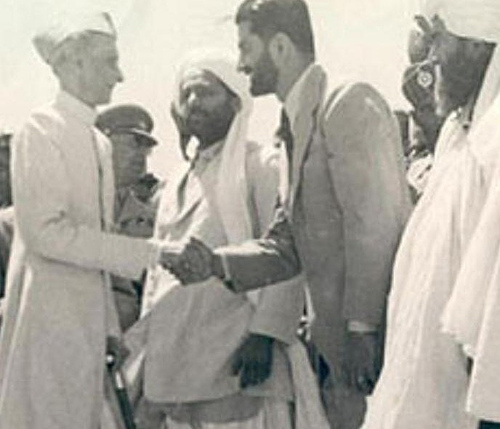Adil Najam
 Government sources in Pakistan have just announced that Nawab Akbar Bugti, chief of the Bugti tribe, veteran politician, and senior Baluchistan leader, has been killed in a shootout between “tribal militants and government forces” in Balochistan.
Government sources in Pakistan have just announced that Nawab Akbar Bugti, chief of the Bugti tribe, veteran politician, and senior Baluchistan leader, has been killed in a shootout between “tribal militants and government forces” in Balochistan.
This is very sad and disturbing news that cannot bode well for anyone. While details are still coming in, BBC reports:
The battle near his mountain hideout in south-west Pakistan also caused heavy casualties on both sides, reports say. More than 20 soldiers and at least 30 rebels died, officials say. The octogenarian has been at the head of a tribal campaign to win political autonomy and a greater share of revenue from Balochistan’s gas reserves. “It is confirmed, Nawab Bugti has been killed in an operation,” Information Minister Mohammad Ali Durrani told Reuters news agency. The battle reportedly took place near the town of Dera Bugti, not far from Mr Bugti’s hideout.
According to a newsflash posted on The News website:
Jamhori Watan Party (JWP) chief Nawab Akbar Khan Bugti was killed in a historical operation carried out by security forces in Kohlu and Murree tribal areas on Saturday night, Federal Information Minister Muhammad Ali Durrani confirmed… Pakistan People’s Party Parliamentarians (PPP-P) leader Makhdoom Amin Faheem termed Akbar Bugti’s death an incident which could worsen security situation in Pakistan.
The death, and the manner of death, of the veteran Baluch leader will indeed worsen the security situation in Baluchistan and exacerbate the feeling of marginalization amongst Baluchis. Nawab Bugti had, at various points in his life, ‘butted heads’ with just about all major leaders in Pakistan. His recent standoff with the Musharraf government was not the highpoint of his own political career but it may well be the lowest point of the Musharraf rule. However, more than the implications on immediate politics – which will become more clear and more pronounced over the next many days – this marks a tragic end to the life of an important political leader.
 Born on July 12, 1927, Nawab Bugto was a ‘ tribal’ who was educated at Oxford, England, Aitchison College, Lahore and Karachi Grammar School and has served as Governor and Chief Minister of Baluchistan. Mr. Bugti’s legacy was clearly a mixed one and will be much debated and much dissected. He was, however, a major leader and this was indeed a sad and tragic way to go.
Born on July 12, 1927, Nawab Bugto was a ‘ tribal’ who was educated at Oxford, England, Aitchison College, Lahore and Karachi Grammar School and has served as Governor and Chief Minister of Baluchistan. Mr. Bugti’s legacy was clearly a mixed one and will be much debated and much dissected. He was, however, a major leader and this was indeed a sad and tragic way to go.




















































Fakir:your anger might be right but its absurd to compare 9/11 with Balochistan situation.There is no doubt there was a sepration movement running in Balochistan.
naveed your sarcasm is ignored.Are you mourning too?;)
Jyoti both India and Afghanistan.Northern Alliance or say Karzai is not good with us either.
Adnan, well done for reminding about Benzir getting her own brother killed. ” neighbour country”? India?:)
“Why is this Sad News?” and “Duh As if Bhutto was a Saint?” and finally “I do not think I need to rely any news sources”. Well done, Adnan ;)
Amazing. The similarity between the argument being made here and those made by the defenders of the War on Terror are amazing.
Step one, repeat that some countries (Iraq) or someone (Bugti) is a terrorists. There is always enough circumstantial evidence to make the case. If you repeat that statement enough times and if the media pounds on it enough, good and decent people will start believing it and will start repeating it, even defending it.
Step two, people will make the connection between the violence around them and the people you are holding responsible for it. So, in New York you hear, “but you see ‘they’ attacked us on 9/11″… and in Karachi you hear “but you see ‘they’ waive black flags”. Both statements are correct but the conclusions reached from them are not.
Step three, now you can justify a brutal action because you have created the great villain. Whether it is going to war in Iraq or military action in Balochistan. Once you convince people that the ‘villian’ is a ‘terrorist’ and they will be more ‘secure’ if he is gone, then … well, then you can do anything. Just as we heard about Iraq and about Lebanon that “these people will only understand the language of force” as a justification for brutal action, now we hear the exact same arument â€